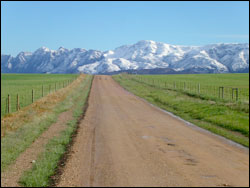The Overberg, an area to the west of the Southern Cape in South Africa, was named by the settlers who crossed its mountains by horse and ox wagon en route from Cape Town to the interior.
 Literally translated, Overberg means “over the mountain”, an apt description
for a paradisical area surrounded by blue mountain ranges and undulating hills
in a kaleidoscope of gold, green and brown. Bordering the Cape Peninsula, the
Overberg never fails to delight even the most discerning, whether tourists,
botanists, hikers, photographers, historians, bird watchers or anglers.
Literally translated, Overberg means “over the mountain”, an apt description
for a paradisical area surrounded by blue mountain ranges and undulating hills
in a kaleidoscope of gold, green and brown. Bordering the Cape Peninsula, the
Overberg never fails to delight even the most discerning, whether tourists,
botanists, hikers, photographers, historians, bird watchers or anglers.  With its Mediterranean climate of hot summers and mild winters, there is
something for everyone. Endless beaches and dunes
underpin a thriving tourist sector, while farmers and those wishing to escape
the rat race may turn their hands to a variety of extremely viable agricultural
activities. These include the cultivation of flowers, fruit and vegetable
farming, vineyard, grain and pasture production, cattle, sheep and ostrich
farming and horse breeding. Fresh water is abundant, and found at both the foot
of the mountains and in the Zoetendalsvlei Lake near Struisbaai, the second
largest fresh water lake in South Africa. This makes irrigation and aquaculture
extremely feasible in an environment which is pollution-free and delicately
perfumed with the fragrance of the natural vegetation along with mountain and
sea air.
With its Mediterranean climate of hot summers and mild winters, there is
something for everyone. Endless beaches and dunes
underpin a thriving tourist sector, while farmers and those wishing to escape
the rat race may turn their hands to a variety of extremely viable agricultural
activities. These include the cultivation of flowers, fruit and vegetable
farming, vineyard, grain and pasture production, cattle, sheep and ostrich
farming and horse breeding. Fresh water is abundant, and found at both the foot
of the mountains and in the Zoetendalsvlei Lake near Struisbaai, the second
largest fresh water lake in South Africa. This makes irrigation and aquaculture
extremely feasible in an environment which is pollution-free and delicately
perfumed with the fragrance of the natural vegetation along with mountain and
sea air.
Officially recognized as the Cape’s Floral Kingdom ...
The Overberg, an area approximately 100 km wide and 200 km long, is home to 175 000 residents. Major towns in the area include Caledon, which boasts its own casino, Bredasdorp with its large population of scientists and professional people who work for the Denel Corporation, Swellendam, which is the historical heart of the Overberg, and coastal resorts such as Hermanus and Struisbaai.
A good infrastructure of tarred roads, medical facilities and schools is complemented by a full range of leisure offerings such as golf, tennis, squash, bowls, cycling and running. Tourism has become a flourishing industry and over the years, a number of Overberg guest houses have received national recognition for excellence. Nature parks in the area include the Bontebok National Park near Swellendam on the banks of the Breede River, the 18 000 hectare L’Agulhas National Park and the De
Hoop Nature and Marine Reserve.
Well known throughout the world for its beautiful beaches and excellent angling, the Overberg has also found fame as the region that includes the southernmost tip of Africa, namely at L’Agulhas, where the Atlantic and Indian Oceans meet. It is also the site of South Africa’s second oldest lighthouse, and a favourite spot for people across the globe to watch the Southern Right Whales calve. Officially recognized as the Cape’s Floral Kingdom, the Overberg with its unique fynbos vegetation is the only complete kingdom of this nature to be
found in a single country. Yet, despite being the smallest such entity in the world, comprising just 0, 06% of the earth’s surface, it is the richest of the world’s six plant kingdoms.

This natural paradise includes 8 700 species, of which 68% are endemic. Almost 75% of the plants listed in the South African Red Data Book are to be found here, of which 1 700 are endangered. There are also more than 300 species or 21 000 of migrant and resident wetland birds in the area, an amount equal to 40% of South Africa’s bird population. It is home, too, to the country’s national bird, the Blue Crane and its national flower, the Protea.
The Overberg region borders the Cape Peninsula and is therefore close to Cape Town and its International Airport, which is considered by many to be the finest in Africa. People have lived here in harmony for many generations and embrace the peace and common destiny that defines the new South Africa.
Click Here to Visit our joint venture Partner's website.


No comments:
Post a Comment